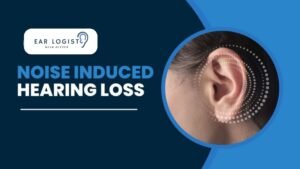Hearing is a key part of our everyday life. It helps us connect with people, hear important sounds, and enjoy the world around us. However, many people face hearing problems, and these issues can range from mild to severe. Recognizing the early signs of hearing loss is important so that you can get help quickly and avoid the problem from getting worse. We will discuss the common symptoms of hearing loss. We’ll talk about the different signs you should watch for, what causes hearing loss, and why it’s important to address these issues early.
What Is Hearing Loss?
Hearing loss happens when you can’t hear sounds as clearly as before. It can affect your ability to understand speech and hear things in your environment. Hearing loss can happen gradually over time or suddenly, depending on the cause. There are three main types of hearing loss:
- Conductive Hearing Loss: This occurs when something blocks sound from passing through the outer or middle ear, like earwax or infections.
- Sensorineural Hearing Loss: This happens when the inner ear or hearing nerve is damaged. Aging and loud noise exposure are common causes.
- Mixed Hearing Loss: This is a combination of both conductive and sensorineural hearing loss.
Common Symptoms of Hearing Loss
No matter the type, there are some common symptoms that may signal hearing loss.
1. Difficulty Following Conversations
One of the first signs of hearing loss is finding it hard to understand conversations, especially when there’s background noise. You might notice that you ask people to repeat themselves often or feel like others are mumbling. This can be especially frustrating in busy places like restaurants or at family gatherings.
2. Turning Up the Volume Too Loud
If you find yourself turning up the TV, radio, or music louder than others around you, this might be a sign of hearing loss. When other people mention that the sound is too loud, but it feels fine to you, it’s time to pay attention to your hearing.
3. Ringing or Buzzing in the Ears (Tinnitus)
Many people with hearing loss experience tinnitus, which is a ringing, buzzing, or hissing sound in the ears. Tinnitus can happen for many reasons, but it is often linked to hearing loss, especially when it’s due to damage to the inner ear.
4. Trouble Hearing on the Phone
Another early sign of hearing loss is having trouble hearing phone conversations. Without being able to see the other person’s lips or body language, it can become harder to follow what they are saying. If you switch the phone from one ear to another, looking for a clearer sound, this may be a warning sign of hearing loss in one ear.
5. Avoiding Social Activities
When hearing becomes difficult, some people start to avoid social gatherings. You might feel embarrassed about asking people to repeat themselves or get tired from trying to follow conversations. Avoiding these situations can lead to loneliness and make the problem worse over time.
6. Misunderstanding What Others Say
Misunderstanding speech, especially in groups or noisy places, is another common symptom of hearing loss. You may respond to a question in the wrong way or miss important details during a conversation. This can be frustrating for you and those around you.
7. Trouble Hearing High-Pitched Sounds
Often, hearing loss affects high-pitched sounds first. You may have trouble hearing the voices of women and children or miss out on sounds like birds chirping or the ringing of a doorbell. If these sounds are becoming less clear, it could be a sign of hearing damage.
8. Feeling Tired After Listening
People with hearing loss often feel tired after socializing because they have to focus harder on what others are saying. Listening becomes more difficult, and you may need to take breaks or rest after long conversations.
9. Inconsistent Hearing
Hearing loss doesn’t always affect both ears equally or in the same way all the time. You might find that some days or situations are worse than others. For example, you might struggle more in noisy places but hear just fine in a quiet room. These inconsistencies could point to early hearing issues.
10. Favoring One Ear Over the Other
Some people with hearing loss in one ear may unconsciously start favoring their “good” ear. You might turn your head so that the better ear is closer to the sound source. If you notice yourself doing this regularly, it’s a sign that you may have hearing loss in one ear.
Causes of Hearing Loss
Hearing loss can be caused by many different factors. Knowing the cause can help find the right treatment. Here are some common causes of hearing loss:
- Aging: As we get older, our hearing naturally becomes less sharp. This type of hearing loss, called presbycusis, usually affects both ears and develops gradually.
- Loud Noise: Repeated exposure to loud noises, like music concerts, machinery, or construction work, can damage the inner ear and cause hearing loss over time.
- Ear Infections: Frequent ear infections can damage the middle ear, leading to temporary or permanent hearing loss.
- Earwax Blockage: Sometimes, too much earwax can build up and block sound from passing through the ear canal, causing temporary hearing loss.
- Certain Medications: Some medications can cause hearing loss as a side effect. These include certain antibiotics, cancer treatments, and other drugs.
- Genetics: Some people are born with a higher risk of hearing loss due to their genes.
- Head Injuries: Trauma to the head or ear can damage the structures of the ear, leading to hearing problems.
Why Early Detection Is Important
Catching hearing loss early is very important because it allows for better treatment options and can prevent the condition from getting worse. If left untreated, hearing loss can lead to other problems, such as difficulty communicating, social withdrawal, and even mental health issues like depression or anxiety.
How to Get Your Hearing Checked
If you think you may have hearing loss, it’s a good idea to get tested by a professional. Here are some common tests that can help diagnose hearing loss:
- Pure-Tone Test: This measures how softly you can hear different pitches and tones.
- Speech Test: This test checks how well you can hear and understand speech at various volumes.
- Middle Ear Test: This checks for problems with the movement of your eardrum or fluid in the middle ear.
- Auditory Brainstem Response Test: This test checks the pathway from your ear to your brain to make sure everything is working correctly.
Managing Hearing Loss
Even though hearing loss can’t always be cured, there are ways to manage it and improve your quality of life. Some common options include:
- Hearing Aids: These devices help make sounds louder, making it easier to hear and communicate.
- Cochlear Implants: For severe hearing loss, cochlear implants might be an option. These devices stimulate the hearing nerve directly.
- Assistive Devices: There are many tools, such as amplified telephones or TV listening systems, that can help those with hearing loss hear better.
- Speech Therapy: Speech therapy can be helpful for people who need help improving their communication skills after hearing loss.
Tips for Preventing Hearing Loss
While some causes of hearing loss, like aging, are unavoidable, others can be prevented. Here are some tips to protect your hearing:
- Protect Your Ears from Loud Noises: Wear earplugs or earmuffs if you are around loud noises, such as at concerts or construction sites.
- Keep the Volume Low: When listening to music or watching TV, avoid turning up the volume too high, especially when using headphones.
- Don’t Use Cotton Swabs in Your Ears: Inserting objects like cotton swabs into your ears can push earwax further in or cause damage.
- Get Regular Hearing Checkups: If you work in a noisy environment or are getting older, regular hearing tests can help catch any problems early.
Conclusion
In conclusion, some common symptoms of hearing loss include trouble hearing conversations, turning up the volume on devices, ringing in the ears, and avoiding social activities. It’s important to pay attention to these signs and get help as soon as possible to prevent the problem from getting worse. Even though hearing loss can be challenging, there are many ways to manage it and continue living a full life.
By being aware of the symptoms and causes of hearing loss, you can take steps to protect your hearing and seek treatment if needed. Hearing is a valuable sense, and with the right care, you can keep it working well for years to come.
Also Read
- What is Fluctuating Hearing Loss?Fluctuating hearing loss means that a person’s hearing ability changes over time. One day, they might hear just fine, and the next day, sounds may seem muffled or distant. These changes can be temporary or happen repeatedly over time. Some
- What Is Hearing Loss Due to Cold?Hearing loss due to cold means your hearing is affected by a cold, either because of the cold weather or a common cold infection. When you have a cold, your nose gets blocked, and that can also affect your ears.
- Cochlear vs Retrocochlear Hearing LossHearing loss affects millions of people worldwide, but it doesn’t always occur for the same reasons or in the same part of the ear. Two common types of hearing loss are cochlear hearing loss and retrocochlear hearing loss. While both
- How to Calculate Hearing Loss PercentageHearing loss can be a complex condition that affects individuals differently. Some people may experience slight difficulty in hearing, while others might suffer from significant impairment. Understanding how to calculate hearing loss percentage is essential, especially for healthcare professionals, insurance
- Noise-Induced Hearing LossNoise-induced hearing loss (NIHL) is a type of hearing loss caused by exposure to loud noises. It happens when the sensitive structures in the inner ear, particularly tiny hair cells, get damaged. These cells are responsible for helping us hear,
Frequently Asked Questions
What are the early signs of hearing loss?
Early signs of hearing loss include difficulty following conversations, especially in noisy environments, and frequently asking others to repeat themselves. You may also turn up the volume on the TV or radio louder than others find comfortable. If you experience ringing in your ears (tinnitus) or struggle to hear high-pitched sounds, these may be additional early symptoms.
What causes hearing loss in most people?
Hearing loss can be caused by aging, exposure to loud noises, ear infections, or earwax buildup. Some medications can also cause hearing problems. Genetic factors play a role in some cases. Repeated exposure to loud environments, like concerts or construction sites, is a common cause of hearing damage over time.
How can I prevent hearing loss?
To prevent hearing loss, protect your ears from loud noises by using earplugs or earmuffs when necessary. Keep the volume on your devices at a safe level, especially when using headphones. Avoid inserting objects like cotton swabs into your ears, and get regular hearing checkups, especially if you’re exposed to noisy environments.
What should I do if I suspect hearing loss?
If you think you have hearing loss, schedule a hearing test with an audiologist or healthcare provider. They can assess your hearing and determine the extent of the problem. Early detection can help prevent further damage and offer options for managing your hearing loss, such as hearing aids or other devices.
How do hearing aids help with hearing loss?
Hearing aids amplify sounds, making it easier to hear and understand speech. They help improve communication in daily activities, especially in noisy environments. Modern hearing aids are customizable and can be adjusted to fit your specific needs. They are small, discreet, and designed to enhance both high and low-frequency sounds.
Can hearing loss be treated or cured?
Some types of hearing loss, such as those caused by earwax buildup or infections, can be treated. However, other types, like age-related or noise-induced hearing loss, are usually permanent. While they can’t be cured, hearing aids, cochlear implants, and other assistive devices can greatly improve quality of life by enhancing hearing ability.
Is hearing loss common in older adults?
Yes, hearing loss is very common as people age. It’s called age-related hearing loss or presbycusis. It typically affects both ears and happens gradually over time. By age 65, about one-third of people experience some level of hearing loss. Regular hearing tests can help detect changes early and offer solutions like hearing aids.
Can loud music damage my hearing?
Yes, listening to loud music, especially through headphones, can damage your hearing over time. Prolonged exposure to loud sounds can lead to permanent hearing loss. It’s important to keep the volume at a safe level and take breaks when listening to music for extended periods to protect your ears.
How often should I get my hearing checked?
It’s recommended to get your hearing checked once every few years, especially if you’re over the age of 50 or work in a noisy environment. If you notice signs of hearing loss, such as difficulty hearing conversations or ringing in your ears, see a healthcare professional for a hearing test as soon as possible.
Can children experience hearing loss?
Yes, children can experience hearing loss due to various factors, including ear infections, genetic conditions, or exposure to loud noises. It’s important to watch for signs like delayed speech development, trouble following directions, or not responding when called. Early detection and treatment can greatly improve outcomes for children with hearing loss.








